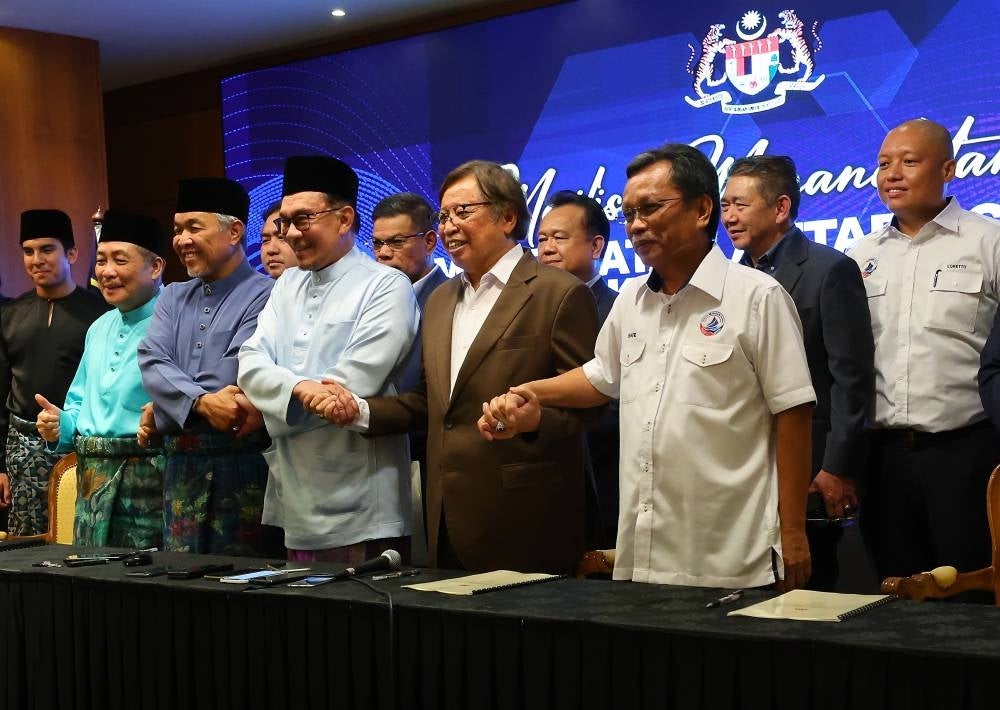Anwar's current formidable support unlikely to betray him on Vote of Confidence Day
CHECKERED REALITY
SYAZA SHUKRI
The new year is fast approaching, and Malaysia is entering 2023 with a new prime minister two decades in the making.
That is, if all goes well on Dec 19, 2022.
Datuk Seri Anwar Ibrahim’s status on Jan 1, 2023 will depend on a confidence motion to be tabled during the first sitting of the 15th Parliament of Malaysia.
Anwar's prerogative to hold a motion of confidence is neither unique nor exceptional in a democratic system both in Malaysia and abroad. In 2022 alone, the most well-known vote of no confidence was held against Imran Khan who was removed as Pakistan’s prime minister in April.
In Malaysia’s short history, Tun Hussein Onn faced a motion of confidence following the death of Tun Abdul Razak Hussein in 1976 and decades later Tun Abdullah Badawi also succeeded in defending himself in a motion of confidence after taking over the premiership from Tun Dr Mahathir Mohamad in 2003.
The issue is now politicised because the previous two prime ministers who were similarly appointed by the Yang di-Pertuan Agong Al-Sultan Abdullah Ri'ayatuddin Al-Mustafa Billah Shah chose not to have a vote of confidence for various reasons. Among them is the fact that the Yang di-Pertuan Agong, as head of state, has chosen the person he deemed to be able to command majority support among parliamentarians and thus a vote was viewed as frivolous.
This is where we are wading into grey territory.
The Yang di-Pertuan Agong is our apolitical head of state who is bound by the democratic process in Malaysia. In other words, the appointment of the prime minister should indirectly represent the people’s choice. Since we do not get to vote for our prime minister, our parliamentarians, in a democratic manner within the august house, are supposed to take on that responsibility on our behalf.
In 2020 and 2021, we the people were not given the privilege of finding out who our individual MPs supported during their interviews with the Yang di-Pertuan Agong. Given the unique circumstances, we understand why the Agong chose this route in making his decisions.
Nevertheless, the appointed prime ministers could have bolstered their position by holding a vote of confidence which was so much more crucial back then when there were no elections in between premiership. Alas, it did not happen.
Even if there is a vote of confidence, MPs would most likely vote according to party line as doing otherwise would probably lead them down the path of a dead end in their political career.
In other words, our previous two prime ministers survived due to the support of party leaders. When that support waned, as it did in 2021, we saw the resignation of Tan Sri Muhyiddin Yassin without facing a vote of no confidence.
Again, nothing is unique about Malaysia’s political scene as the UK also saw two prime ministers in 2022—Boris Johnson and Liz Truss—resigning under pressure of losing confidence in their leadership.
Being politicians, there are complex calculations to an MP making the decision to support or withhold said support for a prime minister. On Dec 19, we will see how these calculations play out for or against Anwar
On one hand, an individual MP may vote according to her or his conscience regarding the choice of prime minister. On the other hand, the anti-party hopping law requires them to abide by decisions made by respective party leaders.
Using that matrix, it is not surprising that Anwar is confident to receive more than a simple majority in passing the vote of confidence.
Cynics would point out that it is not as clear cut as our prime minister is facing certain backlash from his cabinet formation especially in terms of party representation.
However, with the formidable support from all major political parties except for Perikatan Nasional, there is little likelihood for anyone to betray him at this juncture.
Some may also point to Anwar’s position as finance minister being one of his secret weapons to win the motion, but a recent circular on the termination of political appointees would put that suspicion to rest.
Of course, the fact that MPs from Barisan Nasional and Gabungan Parti Sarawak are given 11 ministership and 12 deputy-ministership in a cabinet of 55 people speaks volume about Anwar’s bid to find allies in his so-called National Unity Government.
This decision was met with some derision and calls by certain quarters to vote Anwar out of position for betraying the reform agenda. But what would be the alternative? In the absence of any party having a simple majority, are we going back to the ballot box?
Muhyiddin and Datuk Seri Ismail Sabri Yaakob stayed on as prime ministers for 17 and 15 months respectively without going through a confidence motion. Anwar who led the coalition that won the most votes and seats in the 15th General Election—despite not winning a simple majority—is braving a vote of confidence, nevertheless.
Instead of pushing Malaysia’s political scene into the abyss from sheer politicking, it is time for the opposition to play its role in checking the government without having to say “checkmate!”
Syaza Shukri, PhD is an assistant professor of political science at International Islamic University Malaysia.
The views expressed in this article are the author's own and do not necessarily reflect those of Sinar Daily.












